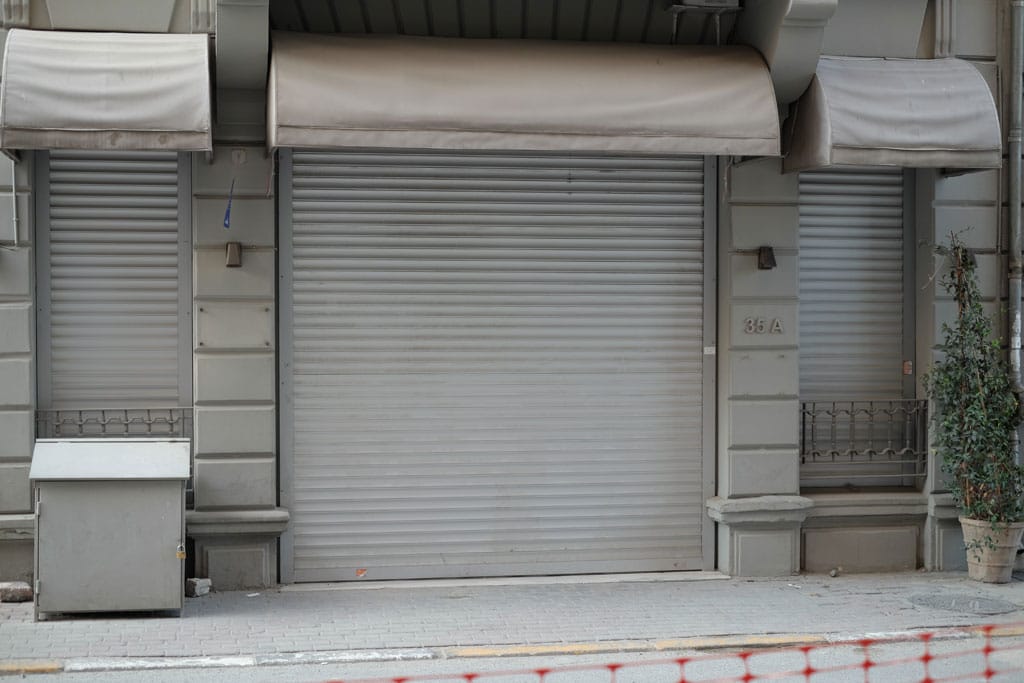As he drove us to Tlacolula, some 19 miles east of Oaxaca City, in his burgundy-and-white taxi, salsa music in the background and a tiny bronze cross hanging from his rearview mirror, our driver Félix was philosophizing about migration. Like many other Oaxacan men, he had, at one point, crossed the border from Mexico to California in search of a better life. And like many fellow countrymen, he had come back home because he refused to live a life of persecution and uncertainty due to his legal status as an undocumented immigrant.
His life back in Mexico was good; hard, yes, but joyful. “I can eat fresh fruits, dance with my kids, watch them grow. If this is not quality of life, I don’t know what it is,” he reflects. The music stops and so does Félix’s taxi. In the middle of the Tlacolula highway we’ve arrived at one of the area’s largest gas stations, and our destination.

As if plucked from any freeway in California, a small shop awaits us across the gas pumps. Against the bright yellow wall, a neon sign in red cursive letters announces Wicho’s Donut House. We are welcomed by sturdy yellow plastic benches and a big counter full of fresh, plump doughnuts. A busy factory is at full gear behind that counter but Edgar, the 25-year-old manager and nephew of Jesús Morales Mendoza, one of the original founders of this thriving family business, comes to greet us. He shows us all the different doughnuts: the Homero, a pink doughnut with colored sprinkles obviously inspired in Homer Simpson; doughnuts covered with chocolate and chunks of fresh peanut; simple glazed doughnuts and ones filled with berry jam; “old fashioned” doughnuts, brownie doughnuts, and so many more it was hard to keep up.

Jesús, 66, and his brothers crossed the border legally to the U.S. in the mid-nineties. They arrived in L.A. with one mission: to work and save money for their families and their parents. Jesús’s father was a construction worker, and his mother a homemaker and farmer; a life of hard work had taught them about the importance of discipline, saving and investing, and they became their sons’ moral compass and financial advisors.
A few days after their arrival in California, Jesús and his brothers were offered a job at a doughnut and coffee shop. “Suddenly, we became bakers. We didn’t know a thing, but we were fearless and eager to work,” explains Jesús. Right there at Winchell’s Donut House in L.A., the Tlacolula-born boys soon mastered all things doughnuts. They learned about the different types of dough, the fillings, the frying, baking and cooking techniques. Months became years for the brothers, every day the same routine: working, saving, dreaming together. Inside Winchell’s hot kitchens, they decided that the first business they would open back home had to be a doughnut shop.

Jesús came back before his brothers. He missed home, but he also wanted to work in his own country. He became food manager of Oaxaca City’s largest hospital and spent his free time conceiving and building the business he and his brothers had dreamed about. The rest of the Morales men – no longer boys – kept sending money from the States. After years of sacrifices, the family reunited in Oaxaca and finally opened their own doughnut shop four years ago, right before the Covid-19 pandemic hit. They decided to name it Wicho’s, a clear reference to their baking alma mater, but also a play on words in Spanish – “Wicho” is the nickname often given to men named “Luis,” of which there happen to be plenty in the Morales family.
Jesús and his brothers didn’t stop there – they set about training the rest of the family in the art of the doughnut. For example, they put a lot of emphasis on the frying: “timing is key,” explains Edgar. “A well-fried doughnut is slightly crispy outside, but soft and not greasy at all. Oil absorption means failure,” he adds. Jesús listens proudly, as he takes a juicy apple cinnamon doughnut from the cardboard box and sips the hot, strong coffee from a Wicho’s logoed cup.

Wicho’s has become so successful that they now source a special doughnut flour directly from providers in Los Angeles. Those who once saw them carrying big bags of flour on their backs are now receiving wire transfers from the same hardworking boys-turned-businessmen. “We have a mixed list of providers; the rest of our materials are sourced from the local farmers and childhood friends, or friends of friends,” explains Jesús. He lists a large number of Tlacolula-based producers and vendors from whom he gets sugar, fruits, grains and his brand merchandise and designs. “The only thing we don’t have to buy is the most important ingredient, love,” he adds, his voice filled with confidence and positivity.

Wicho’s clientele is very diverse, including curious connoisseurs, famous politicians – Mexico’s president himself has visited; relocated foreigners living in Oaxaca City or surroundings, some who even drive an hour to pick up huge boxes full of doughnuts; as well as nostalgic former immigrants, like Félix, who comes often to reminisce on past adventures in the northern lands. Tlacolulans also visit, as Wicho’s is just a stone’s throw from the town, famed for its bustling Sunday market. Local customers visit it for the thrill of trying non-traditional flavors but also because they want to support Wicho’s as much as Wicho’s has supported them – as a 24-7 business, this doughnut shop has become an important source of work for the community and a constant ally for any matter concerning the village.
After learning such a powerful story and tasting those divine doughnuts, we exit Wicho’s in awe. Jesús was too modest to brag or preach about their impressive accomplishments, but what he and his relatives have achieved is something that goes far beyond doughnuts. With Wicho’s, they have found a way to reframe the past, to create their own version of success, to turn doubt into certainty and hopelessness into possibilities. To stop seeing the south side of the border as land devoid of opportunity. To look away from the American dream and trust in the Mexican one. “I told you guys, yes we can, paradise is within us,” says Félix as we get back in his taxi. The salsa music comes back on and we head home, a box of a dozen doughnuts to go now accompanying us.
 December 10, 2019 Café Luciani
December 10, 2019 Café Luciani
When ordering a café in Marseille, keep your eye out for sugar packets and espresso cups […] Posted in Marseille October 24, 2018 Harvest Week
October 24, 2018 Harvest Week
In Mexico, the land of eternal spring, something good to eat is always in season. We […] Posted in Mexico City September 9, 2016 Farewell Lokanta Maya
September 9, 2016 Farewell Lokanta Maya
When Didem Şenol decided to open her first restaurant on an out-of-the-way street in the […] Posted in Istanbul
María ÍtakaJalil Olmedo
Published on May 06, 2024
Related stories
December 10, 2019
MarseilleWhen ordering a café in Marseille, keep your eye out for sugar packets and espresso cups lined in yellow and white. These diagonal stripes are the sign of Café Luciani, a logo inspired by the red and white panels on truck tailgates. Yet while those stripes implore you to be careful and hang back, Luciani…
October 24, 2018
Mexico City | By Nicholas Gilman
Mexico CityIn Mexico, the land of eternal spring, something good to eat is always in season. We ravenously await the arrival of artichokes in March, mangos in April, fresh corn in September. Even the wriggly little gusanos de maguey (maguey worms) which appear in May are wildly anticipated – by some. Change in season is subtle…
September 9, 2016
IstanbulWhen Didem Şenol decided to open her first restaurant on an out-of-the-way street in the then-sleepy Karaköy neighborhood of Istanbul, the young chef’s friends thought she was making a huge mistake. “They said, ‘Are you crazy? There’s nothing there, no one will go there.’ But Karaköy was close to my home in Galata, and I…























































































